 Abraham Lincoln
If given the truth, the people can be depended upon to meet any national crisis...
Abraham Lincoln
If given the truth, the people can be depended upon to meet any national crisis...
 Guildford news...
for Guildford people, brought to you by Guildford reporters - Guildford's own news service
Guildford news...
for Guildford people, brought to you by Guildford reporters - Guildford's own news service
War Changes Everything: Moldova’s Response to Ukrainian Refugee Crisis
Published on: 15 Jul, 2022
Updated on: 17 Jul, 2022
Peter Curran is the chairman of Stoke Community Support, an organisation that did great work during the pandemic helping families in need, particularly by providing meals. During this May’s half-term school holidays it arranged a voucher drop to more than 100 vulnerable local families.
However, as part of his usual work as a development / humanitarian consultant in developing countries, he recently visited Moldova as part of the Ukraine refugee response.
Peter says: “It has been heartwarming to see how people in our own community in Guildford have generously opened their homes to Ukrainian families. The same has been going on in Moldova, which borders Ukraine.
“I worked with Oxfam, The Salvation Army, and UNHCR, and have written an article on the experience focused on conversations with Ukrainian refugees.”
Here is Peter’s article with photos he took while there, with the permission of the people he met.
‘It’s war. Everything is destroyed,” said Valerii, a Ukrainian refugee from Donetsk. He fled with his grandson Dmitro and little else by train to Odessa, where volunteers took them to the Moldovan border.
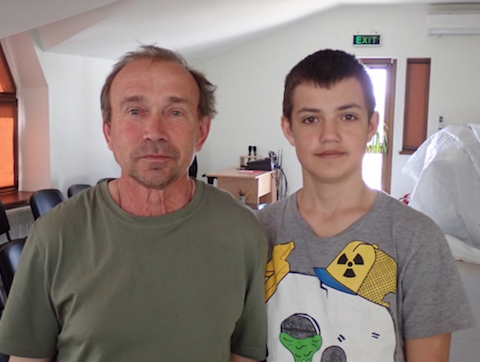 Upon arrival in Chisinau, they were taken in by The Salvation Army at Ialoveni, where the worship area and the Sunday school room have been given over to refugee mattresses. Dmitro, who enjoys PE and drawing, liked the food and was looking forward to starting school in Moldova.
Upon arrival in Chisinau, they were taken in by The Salvation Army at Ialoveni, where the worship area and the Sunday school room have been given over to refugee mattresses. Dmitro, who enjoys PE and drawing, liked the food and was looking forward to starting school in Moldova.
Captain Natalia and her husband Andrei and their team have hosted over 100 Ukrainians, and provided food and clothing for others living in the community. Their children ask excitedly, “Who will come today?” Major Galina, who translated from Russian, spoke of The Salvation Army’s work in Chisinau and its support of other community initiatives to support refugees.
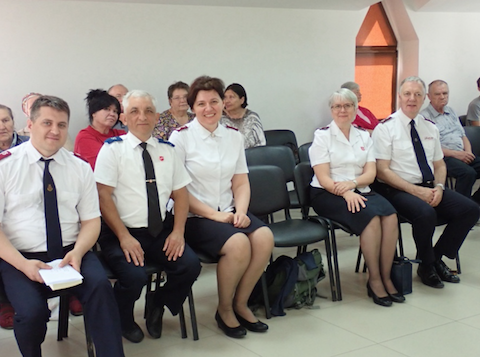 War changes everything. What was once safe and stable is thrown into confusion and fear. Homes are flattened. Plans and hopes are dashed. Education, work and development are put on hold. Keeping your family safe becomes the priority.
War changes everything. What was once safe and stable is thrown into confusion and fear. Homes are flattened. Plans and hopes are dashed. Education, work and development are put on hold. Keeping your family safe becomes the priority.
It has been a similar story in South Sudan and Syria, the Democratic Republic of the Congo, Myanmar, Afghanistan, Yemen and Somalia. The consequences spill over into neighbouring countries; those fleeing the conflict in Ukraine have found safety in Romania and Poland, Slovakia and Hungary and in many countries of western Europe. And in Moldova, a small, impoverished country which has received, per capita, the largest share.
Sitting on the beds in a bare cubicle at the Moldexpo centre in Chisinau, Asa and Natalia, mother and daughter, told their story, in Russian with Dina, a Moldovan legal worker from CDA translating. They smiled but the trauma at having had to leave everything and flee was soon apparent.
“We came out with some clothes, documents and my grandson. We left our home, our TV, our laptop, everything,” said Natalia.
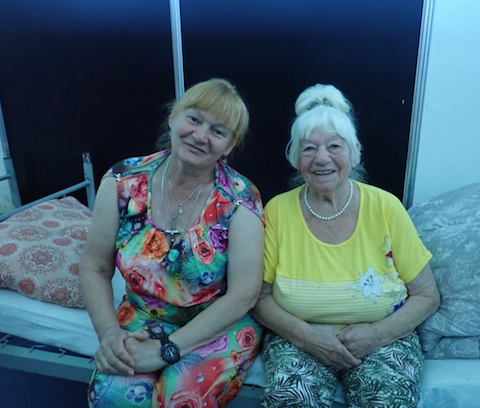 She recounted that Mykolaiv was under fire from rockets and shells from occupied Kherson. “One day a five-storey building was split in two. On another, nine people in the queue for an ATM were killed by a rocket.”
She recounted that Mykolaiv was under fire from rockets and shells from occupied Kherson. “One day a five-storey building was split in two. On another, nine people in the queue for an ATM were killed by a rocket.”
They sheltered in a small room a metre square and prayed. It was the bravery of volunteers from Odessa who got Asa and Natalia out by road. Later, they were taken to the border and into Moldova.
“Moldova is beautiful. Moldovan people are beautiful,” said Asa. Natalie, although missing her home, said: “It’s good here, safe, we have food.”
Their grandson and his mother are now in Finland, and Natalia and Asa hope to join them there. “Our Russian neighbours said Russia is liberating them. But liberators don’t kill people and destroy everything.” Asa, now in her eighties, was close to tears as she added: “I was a small girl during the Second World War. I never thought I would see this again.”
It is always the vulnerable who suffer most during war. But amongst the brutalisation of conflict, acts of love and kindness abound.
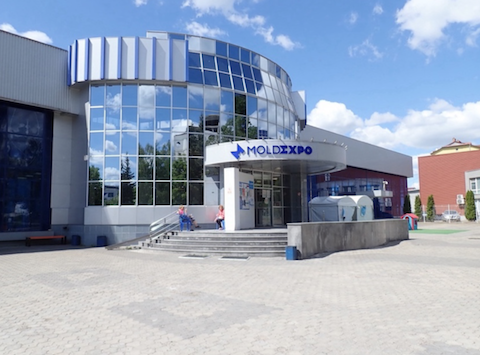 The Moldexpo centre, which had already been repurposed for Covid patients, had been converted again to receive refugees. Aleksandra, a UNHCR shelter co-ordinator from Serbia, explained how they were trying to improve conditions as it got hotter.
The Moldexpo centre, which had already been repurposed for Covid patients, had been converted again to receive refugees. Aleksandra, a UNHCR shelter co-ordinator from Serbia, explained how they were trying to improve conditions as it got hotter.
UN agencies are supporting the Moldovan government in the provision of safe places to sleep, free meals, clothing, a cash scheme, legal advice, child-safe areas, facilities for people to do their own laundry, readily available tea, coffee and snacks, and the freedom to come and go.
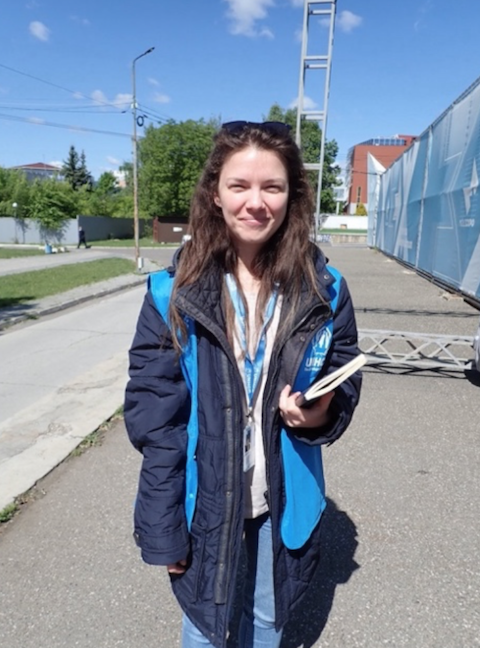 Whilst spartan compared to home, for most it is a safe harbour, a transit centre for a few days before they move to accommodation in the community, some with host families, or to other European countries.
Whilst spartan compared to home, for most it is a safe harbour, a transit centre for a few days before they move to accommodation in the community, some with host families, or to other European countries.
Palanca is a village in the south-eastern tip of Moldova, a couple of kilometres from the border crossing with Ukraine. Igor, the site’s government representative, said that before May 9 (Russia’s Victory Day) thousands crossed here, fearing a Russian offensive in western Ukraine
He was so worried about two unaccompanied minors (aged 15 and 7), that he arranged for his own father to put them up locally until their mother (who was working in the Czech Republic) came to collect them.
The initial humanitarian response was by Moldovans and whilst international agencies and NGOs are now present, it is local organisations and Moldovan host families who still provide the mainstay of support.
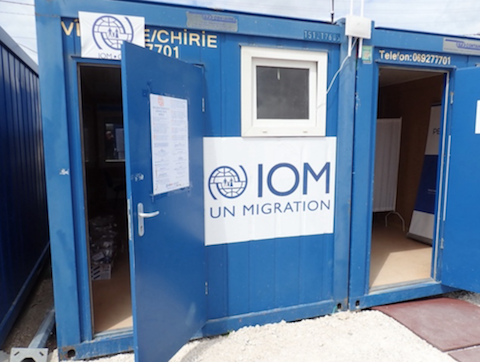 The flow into Moldova has slowed, and some Ukrainians have returned home. But still people cross, mostly women with children. UNHCR and IOM have set up a transit camp in the village, bussing refugees there from the crossing and so reducing the risk of people trafficking.
The flow into Moldova has slowed, and some Ukrainians have returned home. But still people cross, mostly women with children. UNHCR and IOM have set up a transit camp in the village, bussing refugees there from the crossing and so reducing the risk of people trafficking.
George, a UNHCR field officer from Cyprus, described how they had improved security by fencing, cameras and guards.
Arriving refugees are given a warm welcome in a large marquee with food and hot drinks provided by Concordia.
Free onward travel is available, together with toilets, medical and legal support, and friendly spaces for children and teenagers. Most people only stay a few hours before boarding waiting busses to Chisinau or Husi in Romania.
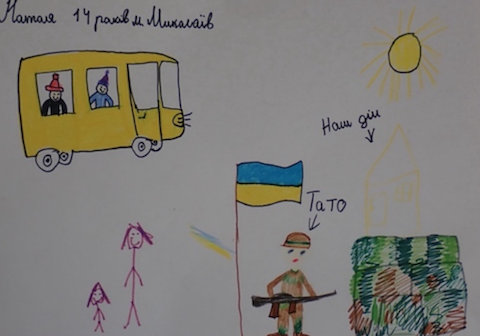 In the child zone run by UNICEF, pictures drawn by the children illustrate the trauma they have experienced in war-torn Ukraine.
In the child zone run by UNICEF, pictures drawn by the children illustrate the trauma they have experienced in war-torn Ukraine.
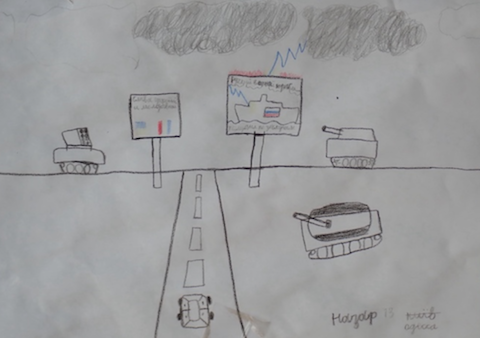 Ana had left Ukraine with five of her children. As we sat and chatted, her children were exploring the child-friendly zone or sitting on the bus. They were from a village in the Mykolaiv area where she said only 160 of several hundred inhabitants now remain.
Ana had left Ukraine with five of her children. As we sat and chatted, her children were exploring the child-friendly zone or sitting on the bus. They were from a village in the Mykolaiv area where she said only 160 of several hundred inhabitants now remain.
Wanting to see her children live in peace, she decided she would take her family to safety at the start of the war but had no money or transport. Ana explained how they lived with explosions for three months, sheltering in the basement.
She used funds provided by the government on food. Eventually, they left for Odessa where they spent three nights in a hostel, then a night with their grandmother near the border.
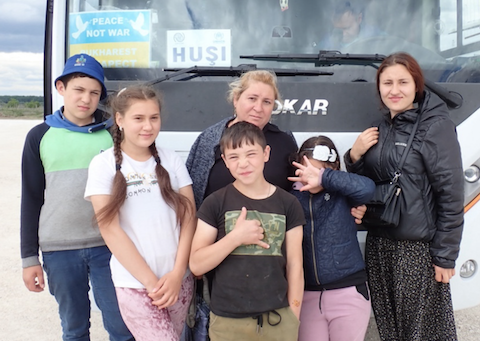 They were heading to Romania, planning to spend a few nights in Bucharest, before moving on to be with her other daughter in Germany.
They were heading to Romania, planning to spend a few nights in Bucharest, before moving on to be with her other daughter in Germany.
She felt at home here as her husband was from Moldova, and says: “The worst experience of all of this was leaving my daughter and three grandchildren behind.”
She explained that another of her daughters had remained in Ukraine to be with her husband. At this point Ana wept and an IOM worker, Luba, gently held her. I waited. She smiled again as we talked about her dog, which was pregnant and would have its puppies in Germany.
A young man who didn’t want to give his name or be photographed painted a vivid picture of life in Odessa. He said: “People are going about their jobs, walking in the parks and the markets. The shops are open but it is far from normal. Four days of every week there are rocket attacks, and in one day alone seven rockets fell.”
That was when his family told him he must leave. “One of the biggest malls was destroyed. Food and petrol prices are up and it is hard to find work. There is a strict 10pm curfew and lots of security check points.”
He described the worst thing for him was being far from his family, who are in Belgium. He was heading for Germany, where a friend already living there had agreed to accommodate him and help him find work.
Of the future, he said, “Things will get worse. But the people in Odessa don’t give up. The only thing that remains is to hope everything will be okay.”
War in Ukraine has brought disastrous consequences for millions of ordinary people. But the generous response to Ukrainian refugees in Moldova and across Europe has shown something stronger is at play.
“Love changes everything” so the song goes.
Whilst the lyrics extol romantic love, the same is true of the wider love, that deep and generous kindness to others that seeks the best for them, to alleviate their suffering.
Such love “always protects, always trusts, always hopes, always perseveres.”
It motivates people to open their homes to those fleeing war, to prepare food, to donate clothes, to give of their skills, time and money; in short, to care.
Many of those who have endured violent attack, disruption, fear and loss, have found a warm welcome and safety in Moldova. Truly, for them, love changes everything.
Recent Articles
- Guildford Institute’s Crowdfunding Project for Accessible Toilet in its New Community and Wellbeing Centre
- Letter: Guildford – Another Opportunity Missed?
- Letter: GBC’s Corporate Strategy – Where Is the Ambition?
- My Memories of John Mayall at a Ground-breaking Gig in Guildford Nearly Six Decades Ago
- Westborough HMO Plans ‘Losing the Heart of the Street’ Says Resident
- College Invests to Boost Surrey’s Economy and Close Digital Skills Gap
- Community Lottery Brings Big Wins for Local Charities
- GBC Housing Plan Promises ‘A Vibrant Urban Neighbourhood’ Near Town Centre
- Hospital Pillows ‘Shortage’ at the Royal Surrey
- Updated: Caravans Set Up Camp at Ash Manor School


Search in Site
Media Gallery
Dragon Interview: Local Artist Leaves Her Mark At One of England’s Most Historic Buildings
January 21, 2023 / No Comment / Read MoreDragon Interview: Lib Dem Planning Chair: ‘Current Policy Doesn’t Work for Local People’
January 19, 2023 / No Comment / Read MoreA3 Tunnel in Guildford ‘Necessary’ for New Homes, Says Guildford’s MP
January 10, 2023 / No Comment / Read More‘Madness’ for London Road Scheme to Go Ahead Against ‘Huge Opposition’, Says SCC Leader
January 6, 2023 / No Comment / Read MoreCouncillor’s Son Starts Campaign for More Consultation on North Street Plan
December 30, 2022 / No Comment / Read MoreCounty Council Climbs Down Over London Road Works – Further ‘Engagement’ Period Announced
December 14, 2022 / No Comment / Read MoreDragon Interview: GBC Reaction to the Government’s Expected Decision to Relax Housing Targets
December 7, 2022 / No Comment / Read MoreHow Can Our Town Centre Businesses Recover? Watch the Shop Front Debate
May 18, 2020 / No Comment / Read More









Recent Comments